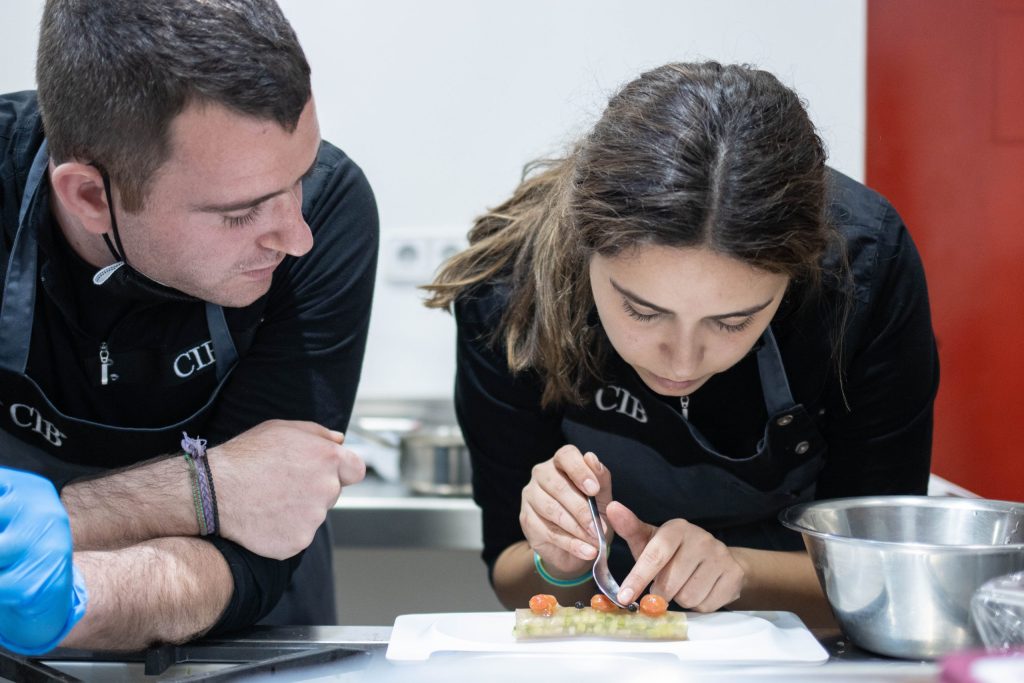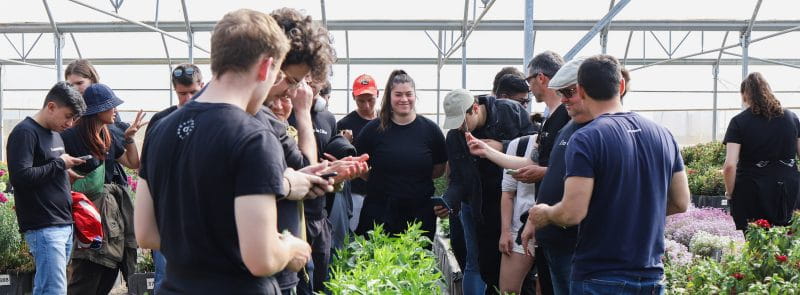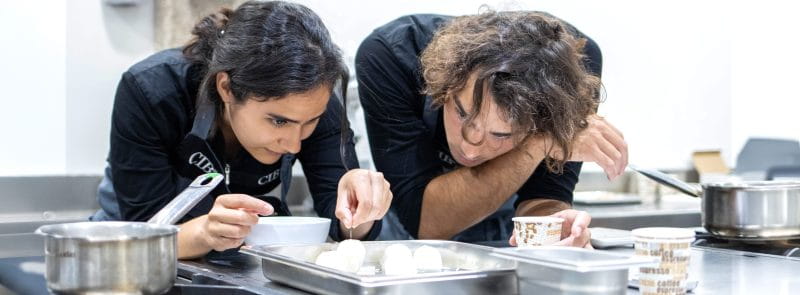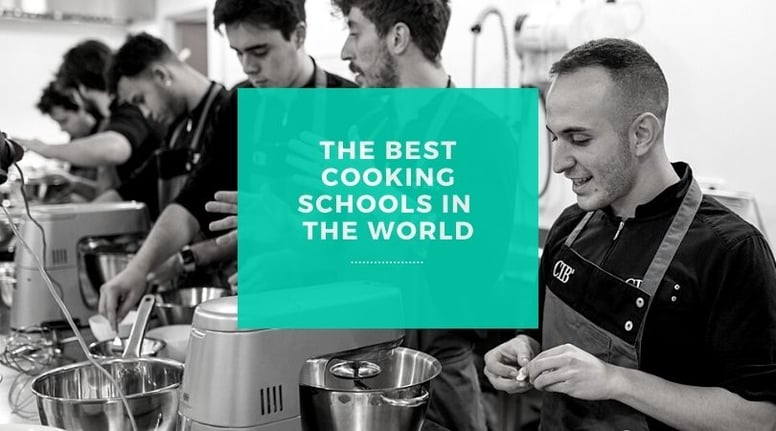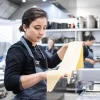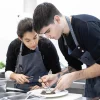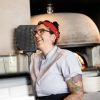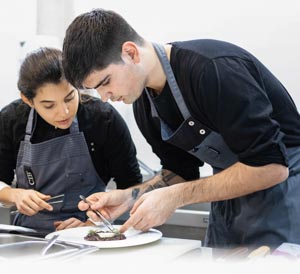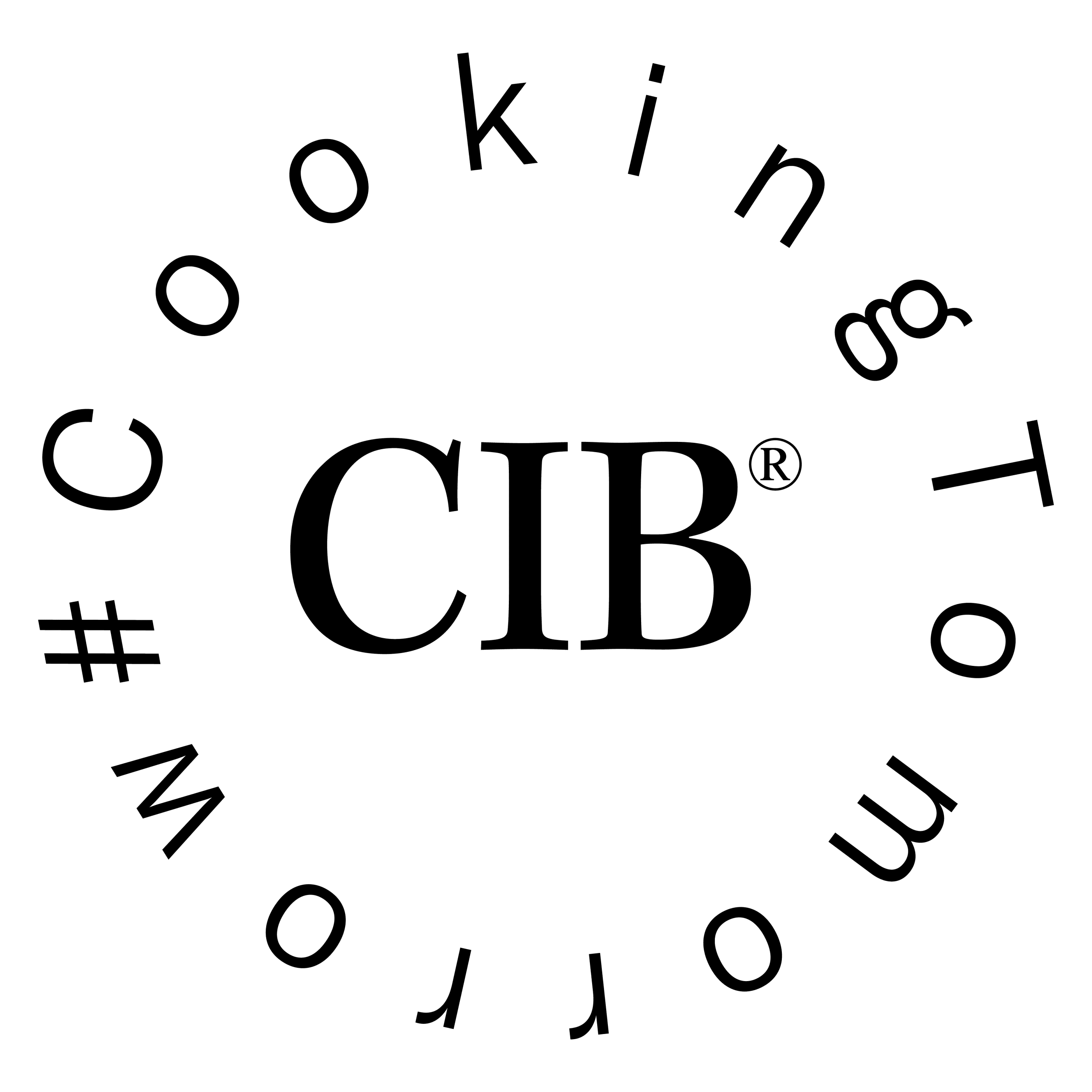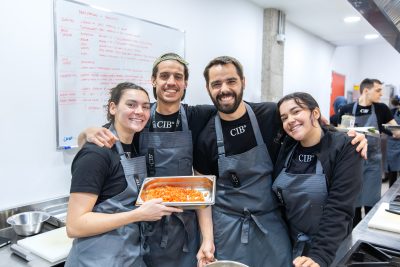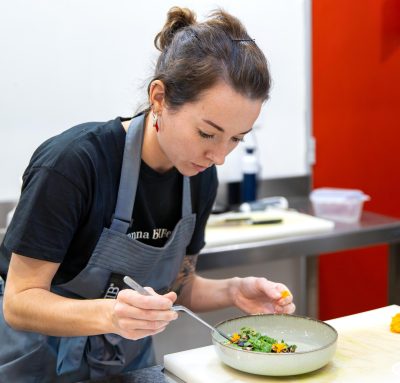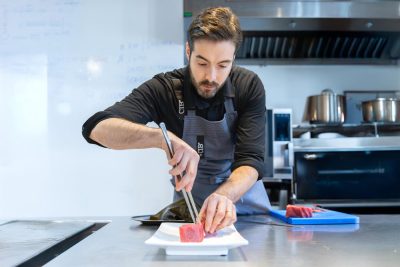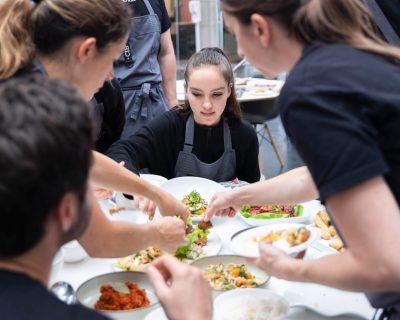If you have reached this page, it is because you probably still have a couple of excuses to finish making the decision about whether you want to study to become a professional chef.
Questions such as: What does it really mean to be a professional chef? What does it take to be a chef, or what requirements are there to be a chef? What should I study, or where to study the profession of chef? Why should I be a chef? Is being a chef really difficult?
The chef career is no longer as it was many years ago. Kitchens have evolved, transforming and adapting to the globalized and digitized world in which we now live. A chef no longer only needs to know basic recipes or techniques, now a chef needs skills that allow him to adapt to the new paradigms of gastronomy, and to the new business models of restoration.
Throughout this guide we will reveal the secrets and tips you need to know to become a successful chef. Studying cooking requires new teaching methodologies that allow your learning to acquire value in the kitchens of the 21st century.
Being a chef: what it really means
The word chef or cook has many associated connotations, and like all professions, its definition adapts and changes according to the context. During an interview with Ferran Adrià, they asked him if he was a cook, to which he replied:
“We could say that I used to use the kitchen to create dishes and now I use it to understand and experiment on the creation and innovation systems. I am a cook trying to create. The attitude of people who want to create and take risks to open paths is different. ” – Ferran Adrià
In the past, gastronomy was not recognized worldwide as it is now. The kitchen was something from home, another necessity of the day to day of the human being. Now, being a chef goes beyond selecting the best ingredients, creating new culinary presentations and pleasing an audience with a composition of surprising smells, colors and flavors.
Being a professional chef today requires having the knowledge and skills necessary to master the most basic techniques to the most current cooking techniques. This involves knowing how new technologies work, which allow the chef to transform products, starting from knowing the physics and chemistry that make them up.
Being a chef means being a chemist, an artist, a communicator, a financier, a creative, and a juggler. It is no longer enough to create complete dishes. A chef must also know how to sell the story behind what he cooks, how much it costs him and what he needs to make a profit; You must know how to manage those who will carry out your creations, and know how to adapt to trends and changes that you still do not know about in the future.
What is clear to us is that the definition and meaning of being a chef will be directly related, with everything that the chef needs to know, know and master to function in today’s kitchens. We’ll tell you then…
The new chef (Meta-Chef) | To be a chef you need …
Acquiring the vision of the future of gastronomy and the world of restoration and assuming the skills required to be a chef in the 21st century is part of being a Meta Chef.
On the one hand, the Meta Chef must be able to master the kitchen, its techniques, methodologies, and functionalities to be able to design, propose and execute high-level culinary projects and, simultaneously, be trained in financial, logistical, and management. If to these elements you add the empowerment of attitudes and the acquisition of methodologies for the development of creativity and innovation in the kitchen; then you can consider yourself a complete chef.A Meta chef has such a wide range of knowledge that he/she can practice in any kitchen or restaurant business in the world, knowing how to adapt not only to cultures, but also to different scenarios at the level of product, technology, and contexts, taking precedence over the challenges of the future.
For this reason, those who want to study to be a chef of the 21st century should not limit themselves to acquiring knowledge, but rather to focus their development on the skills necessary to face the paradigm changes that this century holds and promoting certain attitudes that become a true agent of social change.The possibilities that a chef can have with this preparation will be further boosted if, when studying for this profession, he/she trains with real challenges, he/she becomes capable of creating and developing his own projects or for others; and gets international experiences that enriches his/her background.
Therefore, the tools available to the Meta Chef could be summarized as follows:
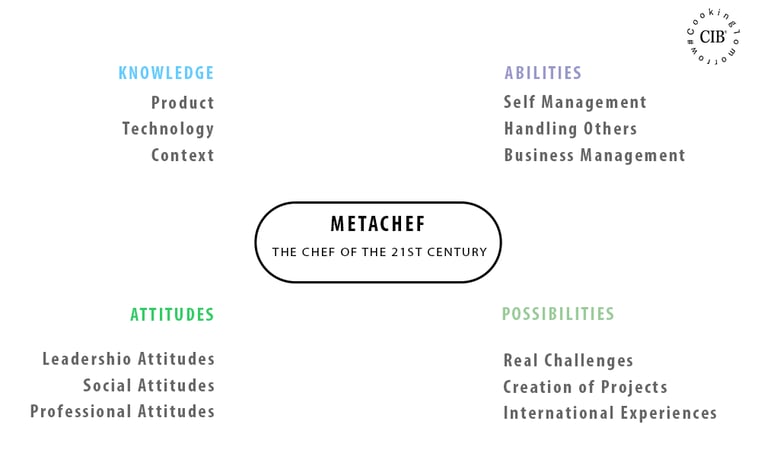
Requirements to be a chef in the kitchens of the 21st century | To be prepared
In an interview made to a Joan Roca by the famous newspaper La Vanguardia, the famous chef comments that twenty years ago he would not have imagined that today there would be so much young talent in his kitchens. Those who lead the world’s largest, most authentic and innovative kitchens are no longer satisfied with a cook with basic knowledge and ancient practices.
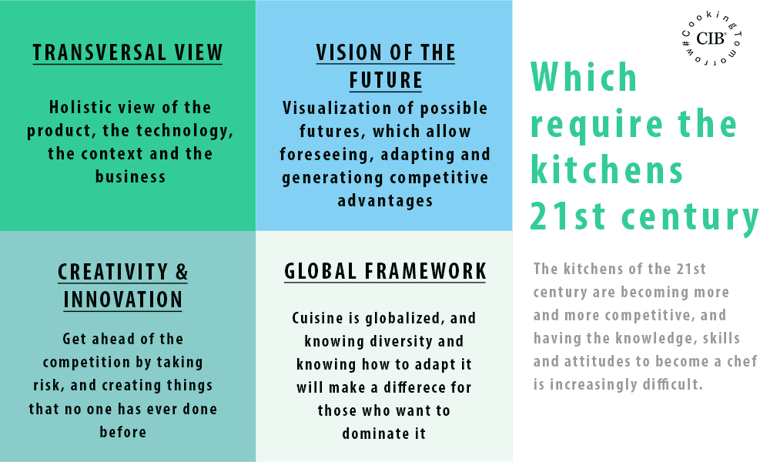
How to be a professional chef and distinguish yourself from the rest | Challenges chefs face
The trends of gastronomy brings new challenges for those who want to study cooking. In addition to meeting the requirements mentioned in the previous section, cooks must now have additional skills that allow them to distinguish themselves.
- Be creative and seek innovation: All chefs must exercise skills related to creativity and innovation to develop lateral thinking. This allows you to have creative processes that make it easy for you to create and renew your most abstract culinary ideas.
- Communicate efficiently: Imagine that you want to start your own business and are looking for investors or partners. Oral, written and conceptual expression will be precise to convince them of your ideas. In the same way, it will work for you with the team you want to lead.
- Manage high performance teams: To manage teams you have to know each of its members, their behaviors, skills, and roles. It is important to have methodologies for all these elements to work effectively.
- Have the ability to make decisions: There are methodologies for correct decision-making, and having this ability makes any professional much more capable of reasoning and avoiding mistakes.
Few professional chefs master these skills, but those who really know them and put them into practice undoubtedly have a competitive advantage over the rest. At the Culinary Institute of Barcelona, for example, the Haute Cuisine Chef Diploma Program, exists to train the future leaders of the kitchens of the 21st century, taking into account the challenges they will face. Tomás, one of his former students, tells you about his experience taking this program:
What do you have to study to be a Chef ?: 6 essential things to learn
Today there are many options to train as a chef. New technologies have even increased the number of self-taught cooks, increasing the reasons and motives for obtaining professional training.
After winning best restaurant in “The world 50 Best Restaurant”, Massimo Bottura revealed in an interview that his project of converting an old agricultural estate into a gastronomy university is due to the fact that he is concerned about young people who love this profession, since he believes that they should have more knowledge, culture and responsibility.
To be a chef you need to study a cooking course that helps you:
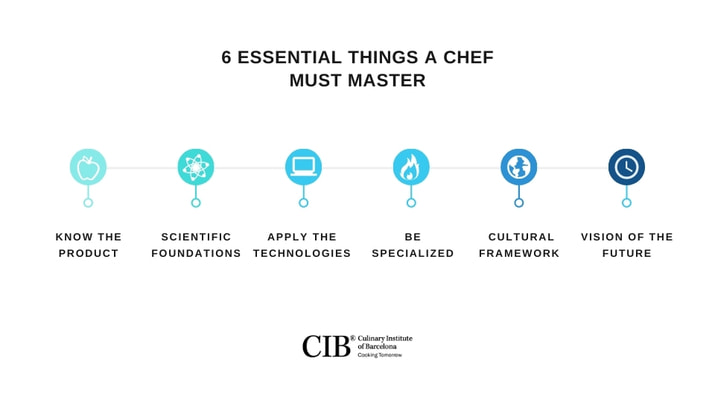
- Knowing the product from different disciplines: It is not a matter of simply analyzing an ingredient or food, but of understanding how it has come to us and how it is related to the environment in which we live.
- Have scientific foundations: through physics, chemistry and biology, the chef must understand what and why happens in each of the culinary processes.
- Understand and apply current kitchen technologies: it is necessary to be a chef, have knowledge and command of all culinary techniques to use them as appropriate to the context or the product.
- Specialize: each chef decides in which area of the kitchen he wants to be a specialist. It does not matter if it is healthy cooking, pastry, chocolate, fire and low temperature or molecular cuisine. The important thing is that you stand out, and it is recommended for this, to differentiate yourself in an area in which you are good and that at the same time you are passionate.
- Having a cultural framework: all part of the origin, and understanding the motivations and cultural contexts that move gastronomy, provides a range of concepts and ideas that can inspire the chef to innovate.
- Have a vision of the future: No chef is successful if he does not have his eyes set on the future. It is necessary to know the trends to try to get ahead of them and to be unique.
Where to study to be a chef: your best options
Choosing a school to study cooking to become a professional chef becomes a fundamental choice in the future of any aspiring to this career. Taking into account the factors that we have shared with you in the previous sections, you will be aware of the importance of differentiating yourself in the world of gastronomy. Being different, unique, and daring to do things like no one has done before comes from the security with which you are able to function in the kitchen. And this security will come from the knowledge, skills and opportunities that are presented to you.For this reason, we help you with a couple of elements that you should take into account before choosing where to study, guaranteeing that the cooking course you choose will provide you with those knowledge and skills that help you take advantage of the opportunities that are given to you in the road.
- You must choose a cooking course where knowledge of the product is paramount.
- In an institution where technologies are the most innovative, and where there are no limits to create new products thanks to them.
- A learning based on creativity and innovation, where methodologies and processes are taught that facilitate the student to create new things.
- A training in which the digital news of the sector are contemplated, to know how to adapt to this new era.
- Subjects that cover not only the necessary knowledge in cooking, but also the lateral skills that a chef must have.
- Challenge-based learning, having the opportunity to face real life cases, being prepared to face the reality of kitchens.
- Experiences outside of the classroom, which expand the student’s gastronomic encyclopedia while learning about the origin of food.
- Specialized teachers for each subject, to obtain the true concepts and advice of current gastronomy from each of their areas.
- Multiculturalism both in its staff and in its students, to enrich gastronomic cultures around the world.
- The location is very important, since if you study in a place where gastronomy is at the highest levels, and where the most successful chefs in the world are developed, you will have greater access to interact with the best.
👉🏽 See the list of the best culinary schools in the world
Career opportunities when studying to be a chef: What does a chef’s job look like?
If you have already convinced yourself to study to become a professional chef, you will surely want to know what your future will look like once you have finished your studies. The advantage of this race is that you can develop in different scenarios.
Here we tell you a little about each of these so that you can decide which one suits you best:
| Profession | How do you know if it is for you? |
| Chef | If what you are passionate about is having your hands on the product, the heat of the grill, the hustle and bustle of the kitchen, the pressure of cooking to the limit, cutting, sautéing, marinating or decorating … you will surely want to be a chef in the kitchen. Knowledge of the product, techniques and technologies will be vital. |
| Production manager | For this position you need to be a true leader, be very organized, and have knowledge at the level of management of production processes to ensure that culinary services are completed successfully. |
| Second head of kitchen | If you like everything related to production processes such as having controlled the existence of raw materials, packaging resources, work tools, delivery times, and so on … then this is the position for you. |
| Co-entrepreneurship in the culinary area | Having a restaurant is the desire of many if not all of those who consider studying to be chefs. The difference of those who reach it is that their knowledge is not limited only to the kitchen, but they have the ability to visualize the future and prepare for any change. |
| Head of innovation projects | It is clear that creativity and innovation go hand in hand with this position, but what not everyone manages to understand is that they must go further. The kitchen must be perceived as a global kitchen, having a 360 vision of gastronomy that allows it to adapt to any kitchen in the world. |
| Private chef | Like the kitchen chef, he must perfectly master the organoleptic qualities of the product, and know the most avant-garde techniques in cooking. What makes this chef different is his ability to manage teams that produce culinary services of any magnitude. |
| Gastronomic director in the food and restaurant industry | Being a gastronomic director includes knowledge of the history of gastronomy, knowledge of the most current trends in the world of cuisine and restoration, and above all you must have a broad vision of the different areas in these businesses. |
| Director of new product development | Knowing how to apply the most current technologies is essential for those who want to develop new products. It is not enough to know the physics and chemistry of the product and use the technologies to transform them… the spirit of creativity and irreverence will be vital to create things that no one has seen before. |
| Gastronomic advisor | The conception of a culinary service for a gastronomic consultant goes from the kitchen to each of the areas of operation of a business. This person has a more holistic vision, which allows him to find the added value of products and services. |
| Responsible for quality and food safety in restaurants | If what you like the most is the environment and framework from the point of view of economic control, occupational hygiene and food safety, you will be inclined towards this professional outlet. |
| Responsible for events and gastronomic activities | Managing the logistics, communication and banquet management as a whole will be the strengths that you must handle. |
Is it clear to you what you would like to do once you are a chef? If you still have doubts, continue reading this guide… We will surely solve a couple more, or all your doubts!
Being a chef in Spain: 5 reasons to study cooking in Spain
From north to south, Spain is full of extraordinary places for lovers of gastronomy. Each of its communities represents a totally different cultural and culinary value, but what is clear is that Spain brings together many of the great chefs who stand out worldwide. Studying cooking in a destination like Spain becomes an advantage for those who want to be a chef, and we tell you why:
- Study with the great talents of the world of cooking. Great chefs recognized worldwide have been born in this country, and the opportunity to visit their restaurants, or even participate with them in classes or lectures becomes possible when choosing a cooking school in Spain.The Roca brothers – Celler de Can Roca (Girona, Catalonia)Ferran Adrià – El Bulli (Barcelona, Catalonia)José Andrés – World Central Kitchen (Asturias, Catalonia)Adoni Luis Aduriz – Mugaritz (San Sebastián)Juan Mari Arzak – Arzak (San Sebastián)Carme Ruscalleda – Sant Pau (San Pol de Mar, Catalonia) / Moments (Barcelona, Catalonia)Martín Berasategui de Lassarte (San Sebastián)Dani García – Tragabuches (Andalusia)Jordi Cruz – ABaC (Barcelona, Catalonia)
- A region with unique products. The climatic seasons are so marked in this territory, and at the same time so different in each of its geographical areas, that they give rise to an endless number of products in each of these. Restaurants are constantly inspired to change their menus, adapting to the original products of each of these periods; which makes the dynamism in his creations more and more innovative.
- A place where gastronomic culture is breathed in every corner. The main cities of Spain, such as Barcelona, Madrid, or San Sebastián; They are known for being international benchmarks in gastronomic innovation. Spain is the epicenter of spectacular Mediterranean cuisine, inspiring many cuisines in the world. In this country, great gastronomic conventions such as the Gastronomic Forum, Alimentaria, Madrid Fusión, San Sebastián Gastronomika, etc. are commemorated year after year. The annual gastronomic agendas exceed 50 medium and large-scale events (not to mention the small fairs that take place around the country every week).
- Vanguard CitiesInnovation and avant-garde go hand in hand with large Spanish cities. It is a great opportunity for those who seek to develop at a professional level, and above all to undertake, since the atmosphere is open, modern and changing.
- Diversity and cultural influence. Not for nothing is Spain classified as one of the 5 countries with the most influential cultures in the world according to an article published by the BBC. Spain is recognized for its global impact for its cuisine, its festivals, its language, and other cultural aspects. These features broaden the possibilities for those who choose to study in any of their cities. It is an opportunity to interact, meet and learn from people from other cultures; and at the same time networking with them. Apart from having endless opportunities at a professional level, its cities are perfect for leisure and fun, which is reinforced by security for those who inhabit or visit them.

